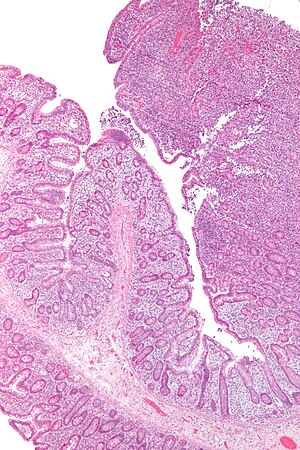Enteropathy-associated T-cell lymphoma
Jump to navigation
Jump to search
Enteropathy-associated T-cell lymphoma, abbreviated EATL, is an uncommon type of lymphoma associated with celiac disease.
| Enteropathy-associated T-cell lymphoma | |
|---|---|
| Diagnosis in short | |
 Enteropathy-associated T cell lymphoma. H&E stain. | |
|
| |
| Synonyms | enteropathy-type T-cell lymphoma |
|
| |
| LM | large or medium-sized lymphoid cells in the mucosa and submucosa |
| Subtypes | Historical: pleomorphic anaplastic (type I), monomorphic (type II) |
| LM DDx | other lymphomas |
| IHC | CD3 +ve, CD5 -ve, CD8 -ve/+ve, CD56 -ve/+ve, CD30 +ve |
| Site | duodenum |
|
| |
| Associated Dx | celiac disease |
| Clinical history | history of celiac disease |
| Prevalence | uncommon |
| Prognosis | poor |
| Clin. DDx | dependent on presentation - other causes of SBO, e.g. duodenal adenocarcinoma |
It is also known as enteropathy-type T-cell lymphoma, abbreviated ETTL.
General
- T cell lymphoma classically due to celiac sprue.
- Historically subdivided into type I and type II.[1]
- Pleomorphic anaplastic (type I) associated with celiac sprue.[2] - this is now referred to as EATL since the 2017 revision of the WHO blue book 4th edition.
- Monomorphic (type II) not associated with celiac sprue - this is separate entity known as monomorphic epidermotropic intestinal T-cell lymphoma; it is no longer referred to as EATL as it is not associated with an enteropathy.
- Poor prognosis.[3]
- Five-year survival as low as 20%.[4]
Presentations - may include:
- Small bowel obstruction (SBO) or perforation.[5]
- GI hemorrhage.[4]
Treatment:
Gross
Features:[8]
- Typically manifest as ulcers, fissures or plaques. †
Notes:
- † B-cell lymphomas are typically raised nodules.[8]
Microscopic
Features:[9]
- Abundant large or medium-sized lymphoid cells in the mucosa and submucosa.
- Large-sized cells ~ 2x RBC diameter = type 1.
- Medium sized cells ~ 1.5x RBC diameter = type 2.
- Intestinal epithelium usually preserved.
DDx:
- Other types of lymphoma.
Image
IHC
- CD56 -ve.
- CD3 +ve.
- CD5 -ve.
- CD8 -ve/+ve.
- CD56 +ve.
- CD30 +ve.
See also
References
- ↑ Delabie J, et al (July 2011). "Enteropathy-associated T-cell lymphoma: clinical and histological findings from the International Peripheral T-Cell Lymphoma Project". Blood 118 (148): 148.
- ↑ 2.0 2.1 "Enteropathy-type T-cell lymphoma". Am. J. Clin. Pathol. 127 (5): 701–6. May 2007. doi:10.1309/nw2bk1dxb0eqg55h. PMID 17511112.
- ↑ Malamut, G.; Chandesris, O.; Verkarre, V.; Meresse, B.; Callens, C.; Macintyre, E.; Bouhnik, Y.; Gornet, JM. et al. (May 2013). "Enteropathy associated T cell lymphoma in celiac disease: a large retrospective study.". Dig Liver Dis 45 (5): 377-84. doi:10.1016/j.dld.2012.12.001. PMID 23313469.
- ↑ 4.0 4.1 Pun, AH.; Kasmeridis, H.; Rieger, N.; Loganathan, A. (2014). "Enteropathy associated T-cell lymphoma presenting with multiple episodes of small bowel haemorrhage and perforation.". J Surg Case Rep 2014 (3). doi:10.1093/jscr/rju013. PMID 24876396.
- ↑ Kim, JB.; Kim, SH.; Cho, YK.; Ahn, SB.; Jo, YJ.; Park, YS.; Lee, JH.; Kim, DH. et al. (Mar 2013). "A case of colon perforation due to enteropathy-associated T-cell lymphoma.". World J Gastroenterol 19 (11): 1841-4. doi:10.3748/wjg.v19.i11.1841. PMID 23555174.
- ↑ Cairoli, A.; Ketterer, N.; Barelli, S.; Duchosal, MA. (Aug 2014). "High-dose therapy and autologous hematopoietic stem cell transplant in T-cell lymphoma: a single center experience.". Leuk Lymphoma 55 (8): 1827-31. doi:10.3109/10428194.2013.852666. PMID 24138331.
- ↑ Jantunen, E.; Boumendil, A.; Finel, H.; Luan, JJ.; Johnson, P.; Rambaldi, A.; Haynes, A.; Duchosal, MA. et al. (Mar 2013). "Autologous stem cell transplantation for enteropathy-associated T-cell lymphoma: a retrospective study by the EBMT.". Blood 121 (13): 2529-32. doi:10.1182/blood-2012-11-466839. PMID 23361910.
- ↑ 8.0 8.1 Jiao, G.; Zheng, Z.; Jiang, K.; Zhang, J.; Wang, B. (Jul 2014). "Enteropathy-associated T-cell lymphoma presenting with gastrointestinal tract symptoms: A report of two cases and review of diagnostic challenges and clinicopathological correlation.". Oncol Lett 8 (1): 91-94. doi:10.3892/ol.2014.2105. PMID 24959225.
- ↑ 9.0 9.1 9.2 Takeshita, M.; Nakamura, S.; Kikuma, K.; Nakayama, Y.; Nimura, S.; Yao, T.; Urabe, S.; Ogawara, S. et al. (Feb 2011). "Pathological and immunohistological findings and genetic aberrations of intestinal enteropathy-associated T cell lymphoma in Japan.". Histopathology 58 (3): 395-407. doi:10.1111/j.1365-2559.2011.03768.x. PMID 21323966.
- ↑ Kim, do H.; Lee, D.; Kim, JW.; Huh, J.; Park, SH.; Ha, HK.; Suh, C.; Yoon, SM. et al. (May 2014). "Endoscopic and clinical analysis of primary T-cell lymphoma of the gastrointestinal tract according to pathological subtype.". J Gastroenterol Hepatol 29 (5): 934-43. doi:10.1111/jgh.12471. PMID 24325295.
- ↑ Chan, JK.; Chan, AC.; Cheuk, W.; Wan, SK.; Lee, WK.; Lui, YH.; Chan, WK. (Oct 2011). "Type II enteropathy-associated T-cell lymphoma: a distinct aggressive lymphoma with frequent γδ T-cell receptor expression.". Am J Surg Pathol 35 (10): 1557-69. doi:10.1097/PAS.0b013e318222dfcd. PMID 21921780.